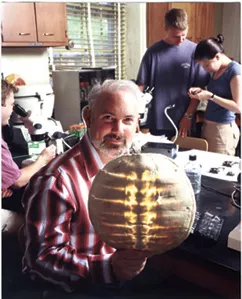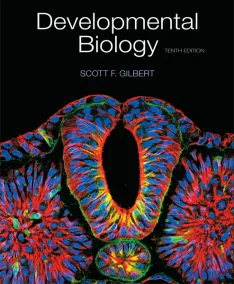Scott Gilbert's Developmental Biology Textbook Celebrates Tenth Edition

First published in 1985, Howard A. Schneiderman Professor Emeritus Scott Gilbert's Developmental Biology has evolved along with both the textbook industry and the science it covers, as it celebrates its tenth edition. The most recent incarnation reflects how molecular, cellular, and anatomical perspectives on development have been integrated.
"Different groups of scientists tend to focus on different levels of development," says Gilbert. "For instance, medical groups may focus on the origins of heart anatomy, cell biologists will look at the mechanisms of cell movement and interaction that forms the parts of the heart, and molecular biologists generally focus on the genes that are involved in specifying the ventricles, atria, valves, and so forth. Within the past few years, these perspectives have been integrated together, and this book tried to reflect this integration."
Another distinguishing factor of the newest edition of Developmental Biology is "its emphasis on the regulation of development by the interplay of environmental and genetic factors," Gilbert says. "It emphasizes the roles that symbiotic bacteria, maternal diet, and other factors have on normal and abnormal development."
Gilbert, an expert in developmental genetics and embryology, is a past chair of the Division of Developmental and Cell Biology of the Society for Integrative and Comparative Biology. His latest work also covers the history of biology and its social functions. This summer, Science profiled his work on how microbes shape animal development, as well as his longstanding interest in how turtles get their shells.
The idea for Developmental Biology, as detailed in the Swarthmore College Bulletin [p. 23], germinated in the late 1970s when the study of how organisms grow and develop was underoing rapid change. Existing textbooks focused either on molecular development or anotomical development, but no work was available to bridge the gap. Gilbert, who had expressed dissatisfaction with the selection of books he could use to teach this shift in perspective, decided to write one himself.

Developmental Biology
"The idea was that I should either put up or shut up," he says.
Throughout its evolution, Developmental Biology has been a community effort. Gilbert has received assistance from students, alumni, and staff members with typing, proof-reading, editing, and website creation.
Gilbert sees Developmental Biology as the starting point of a whole learning module that college biology students receive. He was one of the first authors to embed in a textbook web references to a site specificially designed for that book. Gilbert's texts differs from others because of its historical content, which Gilbert believes is important to the study of developmental biology.
"Looking at the history, we show that developmental biology was done by a wide range of peoples in many different countries with many different persepectives," he says. "There's no one way of being a developmental biologist. This is important for the students to know."
In addition to Developmental Biology, Gilbert has two other books in print: Bioethics and the New Embryology, a volume that counts Emily Zackin '02 and Anna Tyler '03 as its co-authors, which discusses new findings in developmental biology with respect to philosophy and religion, and Ecological Developmental Biology, a textbook co-authored with David Epel which integrates developmental plasticity, epigenetics, and symbiosis into discussions of medicine and evolution.
Gilbert is the recipient of several awards, including the Medal of François I from the Collège de France, the Dwight J. Ingle Memorial Writing Award, the Choice Outstanding Academic Book Award, honorary doctorates from the University of Helsinki and the University of Tartu, and a John Simon Guggenheim Foundation Grant. In 2002, the Society for Developmental Biology awarded him its first Viktor Hamburger Prize for Excellence in Education, and in 2004, he was awarded the Kowalevsky Prize in Evolutionary Developmental Biology. He is also a Finland Distinguished Professor at the University of Helsinki.



